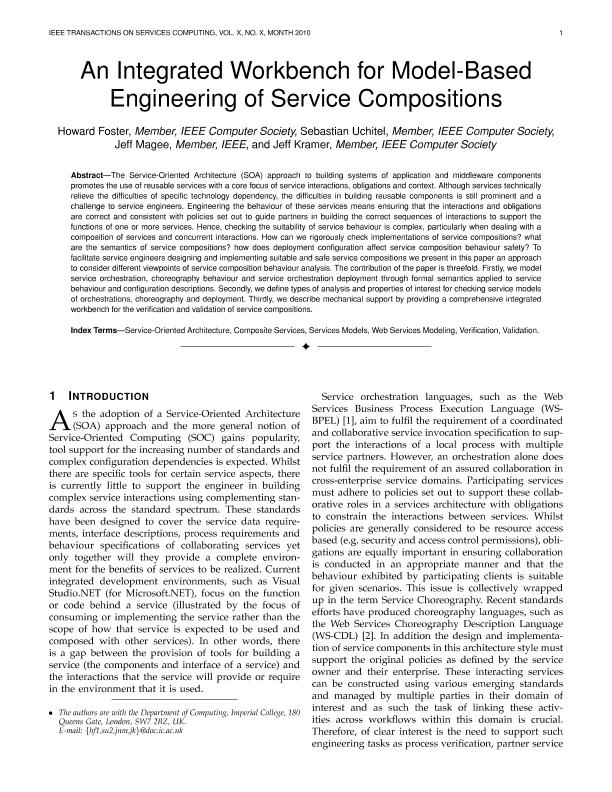Mostrar el registro sencillo del ítem
dc.contributor.author
Foster, Howard

dc.contributor.author
Uchitel, Sebastian

dc.contributor.author
Magee, Jeff

dc.contributor.author
Kramer, Jeff

dc.date.available
2017-05-12T21:45:03Z
dc.date.issued
2010-05
dc.identifier.citation
Foster, Howard; Uchitel, Sebastian; Magee, Jeff; Kramer, Jeff; An integrated workbench for model-based engineering of service compositions; IEEE Computer Society; IEEE Transactions on Services Computing; 3; 2; 5-2010; 131-144
dc.identifier.issn
1939-1374
dc.identifier.uri
http://hdl.handle.net/11336/16442
dc.description.abstract
The Service-Oriented Architecture (SOA) approach to building systems of application and middleware components promotes the use of reusable services with a core focus of service interactions, obligations, and context. Although services technically relieve the difficulties of specific technology dependency, the difficulties in building reusable components is still prominent and a challenge to service engineers. Engineering the behavior of these services means ensuring that the interactions and obligations are correct and consistent with policies set out to guide partners in building the correct sequences of interactions to support the functions of one or more services. Hence, checking the suitability of service behavior is complex, particularly when dealing with a composition of services and concurrent interactions. How can we rigorously check implementations of service compositions? What are the semantics of service compositions? How does deployment configuration affect service composition behavior safety? To facilitate service engineers designing and implementing suitable and safe service compositions, we present in this paper an approach to consider different viewpoints of service composition behavior analysis. The contribution of the paper is threefold. First, we model service orchestration, choreography behavior, and service orchestration deployment through formal semantics applied to service behavior and configuration descriptions. Second, we define types of analysis and properties of interest for checking service models of orchestrations, choreography, and deployment. Third, we describe mechanical support by providing a comprehensive integrated workbench for the verification and validation of service compositions.
dc.format
application/pdf
dc.language.iso
eng
dc.publisher
IEEE Computer Society

dc.rights
info:eu-repo/semantics/openAccess
dc.rights.uri
https://creativecommons.org/licenses/by-nc-sa/2.5/ar/
dc.subject
Service Oriented Computing
dc.subject
Software Engineering
dc.subject.classification
Ciencias de la Computación

dc.subject.classification
Ciencias de la Computación e Información

dc.subject.classification
CIENCIAS NATURALES Y EXACTAS

dc.title
An integrated workbench for model-based engineering of service compositions
dc.type
info:eu-repo/semantics/article
dc.type
info:ar-repo/semantics/artículo
dc.type
info:eu-repo/semantics/publishedVersion
dc.date.updated
2017-05-11T20:57:11Z
dc.journal.volume
3
dc.journal.number
2
dc.journal.pagination
131-144
dc.journal.pais
Estados Unidos

dc.journal.ciudad
Los Alamitos
dc.description.fil
Fil: Foster, Howard. Imperial College London; Reino Unido
dc.description.fil
Fil: Uchitel, Sebastian. Imperial College London; Reino Unido. Consejo Nacional de Investigaciones Científicas y Técnicas; Argentina
dc.description.fil
Fil: Magee, Jeff. Imperial College London; Reino Unido
dc.description.fil
Fil: Kramer, Jeff. Imperial College London; Reino Unido
dc.journal.title
IEEE Transactions on Services Computing
dc.relation.alternativeid
info:eu-repo/semantics/altIdentifier/doi/http://dx.doi.org/10.1109/TSC.2010.19
dc.relation.alternativeid
info:eu-repo/semantics/altIdentifier/url/http://ieeexplore.ieee.org/document/5467021/
Archivos asociados
